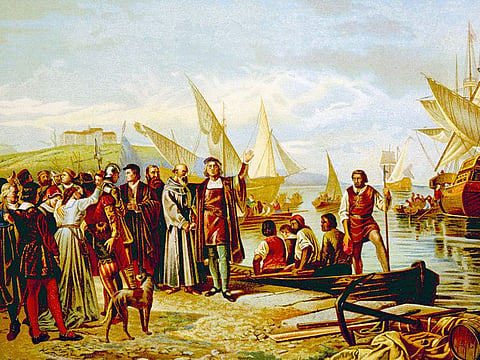Why Columbus and Pilgrims were not heroic historical figures
How massacres and disease shaped the Pilgrim-Native alliance at the root of the holiday

In the first line of T.S. Eliot’s 1922 signature poem, The Wasteland, we are told that April is the cruelest month of the year.
White Americans concur, if only because the 15th day of that month is the annual deadline set for submitting their tax returns, along with their checks, to the dreaded, ever vigilant Internal Revenue Serce, the most feared government agency in the world. Give us the choice between the prospect of a root canal and that of an IRS audit, these Americans would opt for the former in a heartbeat.
Native Americans, however, have not one month but two that they consider the cruelest of the year — the second Monday of October, that commemorates Columbus Day, and the fourth Thursday of November, that commemorates Thanksgiving Day, a time each year when, albeit inadvertently, White Americans in effect celebrate the genocide perpetrated against their ancestors.
To the average, not overly engaged White American, Columbus Day is a benign affair meant to celebrate the time Christopher Columbus “discovered” the New World in 1492; to honour the man’s “achievements”; and, given the Italian explorer’s ethnic background, glory in the heritage of Italian heritage.
Also Read: The importance of being Jimmy Carter
Not so fast, please, say Native Americans and their supporters around the country. For starters, Columbus did not “discover” the New World, for he had arrived in a land that had for millennia been inhabited by indigenous peoples with rich cultures and cosmologies. And, more importantly, he did not arrive there as a heroic figure imbued with kindly intentions.
Rather, Native Americans, along with a not insignificant number of White Americans, will tell you that the man was a brute. He employed violence against the Native people (whom he called “Indians”) in an effort to subdue and enslave them (his own diaries attest to that), introduced the practice of forced conversion to Christianity as a “civilising” tool and brought the dreadful gift of a host of new diseases from the Old World that decimated tens of thousands in their communities.
The last Columbus Day, not quite two weeks ago, is already behind us. Soon, on Nov. 24, Thanksgiving Day will be upon us, a day declared a national holiday by President Abraham Lincoln in 1863, with the centrepiece of its celebration being an elaborate thanksgiving dinner.
And here too Native Americans have a bone to pick with the way the overwhelming majority of White Americans view the day, taking issue with the prevailing White narrative of it, which paints a deceptively benign portrait between the indigenous people and the Pilgrims.
The many versions
The Pilgrims, of course, were those 102 wretched asylum seekers (the right term to use were we to employ today’s vernacular) who in September 1620 boarded a small ship named The Mayflower in Plymouth, England, and sailed to the New World — lured by the promise of land ownership there for the taking and of freedom to practice their faith as they wished — arriving after a harrowing 66-day crossing, where in November, after a bountiful harvest, they gathered for a thanksgiving, heart-warming with their dear, indigenous neighbours. So the story went.
In reality that portrait is well-meaning but fictitious. The history of interaction between the Pilgrims and the indigenous people they encountered, the Wampanoag Nation, was marked by violence that killed thousands from the latter community and disinherited thousands more of their ancestral lands.
The way Native Americans see Thanksgiving Day in our time can be summed up in how United American Indians of New England, founded in 1970, described it: “Thanksgiving Day is a reminder of the genocide of millions of Native People, the theft of Native land and the relentless assault on Native culture ... a [day] of protest against the racism and oppression which Native Americans continue to experience”.
Since the late 1960s, very many White Americans, who are in touch with their history, have expressed impatience with syrupy-sweet, even at times fabricated stories about what Columbus Day and Thanksgiving Day are all about, and have been demanded that their fellow White Americans reckon with their past for a change.
Many folks did. Beginning in 1970, Thanksgiving Day began to get renamed National Mourning Day, and each year since then protesters have gathered on a hill overlooking Plymouth Rock to commemorate it, with similar events held in other parts of the country.
As for Columbus Day, it too has been renamed, and officially so, as Indigenous Peoples Day, by numerous states and cities across the US — including Republican strongholds like Louisiana. And let’s not forget, two years ago, in the wake of the George Floyd protests, many a Columbus statue was toppled. (Please take note: Washington, DC, my hometown for the last 47 years, not only renamed Columbus Day in equal manner but it also renamed its storied football team, formerly the Redskins, a truly offensive name, the Commanders.)
It’s about time that we, as Roxanne Dunbar Ortiz, renowned historian of indigenous culture, reminded us in a piece in Boston Globe last week, recognised “the lust for displacing and killing Native Americans” for what it was.
It is equally time to recognise, I say, how harmful it was to the collective American soul has been, over generations, the codification of a vernacular that in effect distinguished the “savage” Native American from his “civilised” White counterpart. There’s a lesson here for cultures that create not only dichotomies but plus-minus dichotomies among segments of their populace.
Fawaz Turki is a journalist, academic and author based in Washington. He is the author of The Disinherited: Journal of a Palestinian Exile.


